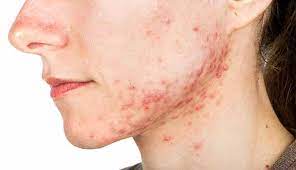Cystic acne : Causes, Symptoms, and Treatment

Cystic acne is a common yet severe form of acne, which are deep, painful cysts existing beneath the skin surface, affecting one’s self esteem and quality of life. In this essay, we will discover the symptoms, causes and treatment options for cystic acne.
Cystic acne is a form of acne which are deep formed cysts beneath the skin surface. The cysts are filled with pus and can be painful to even touch. Unlike other pimples and acnes, cystic acnes develop deep under the skin, making it more critical and challenging to treat often left with scars.
Cystic acne can be an output of various factors such as
- Hormonal imbalance : Unstable hormones especially testosterone can help trigger the sebaceous glands producing excess oil, leading to clogged pores.
- Genetics : Family history plays a vital role in determining the risks of cystic acne. If one or both the parents had a history of severe acne, it is more likely for their child with similar skin issues.
- Excessive sebum production : Sebum is a natural oil produced by the skin and gets trapped in hair follicles resulting in Growth of acne causing bacteria and inflammation.
- Bacterial infection : A bacteria that lives in the oily surface of the skin often implicates the development of cystic acne.
Cystic acne can affect anyone irrespective of their age and gender. It affects people who are :
- Adolescents and young adults : Hormonal imbalance during puberty and adolescence can trigger acne, including cystic acne.
- Women : Women experience menstrual cycle, pregnancy, and menopause which can destabilize their hormones making cystic acne more prone in women.
- Family history : Genetics plays a huge role in cystic acne, any parent who has faced it, it surely can be pre deposited in the child.
- Other medical conditions : People with conditions such as polycystic ovarian syndrome ( PCOS ) and adrenal gland disorders can disturb the hormonal imbalance leading to cystic acne.
Cystic acne can be critical but with proper care, treatment and lifestyle modifications it can get better. It is necessary to live a healthy lifestyle and focus on more self care routines to help your skin get better in managing cystic acne.
- Balanced diet : It is important to understand that sugars, dairy products and processed foods can trigger your acne issues. Instead of that focusing on the intake of fruits, vegetables and omega – 3 fatty acids can support skin health and reduce inflammation.
- Skincare routine : Make sure you practice skin care everyday in order to protect it from cystic acne. Cleanse, moisturize and put products that suit your scene to help prevent acne.
- Stress management : Stress can be the biggest cause of getting acne. So it is essential to manage and practice stress relieving techniques to avoid stress related cystic acne.
- Avoid trigger factors : Make sure to keep a check on the food, cosmetics and skincare products which may trigger your cystic acne. Avoiding them would help reduce the risks of cystic acne.
- Consult a professional : Consulting a dermatologist can be helpful, they can provide personalized advice and treatments perfectly made for your skin type.
However, cystic acne can have lasting physical and emotional scars, by taking preventive measures can help prevent complications and reduce the risk of cystic acne in the future. They can be :
- Addressing scars : Noticing scars should be addressed at the earliest, which can prevent cystic acne. Treatment options such as microneedling, laser resurfacing, or fillers help promote mother and even textured skin.
- Routine skin care : Practicing good hygiene, avoiding picking or squeezing acne, and always protecting skin from sun damage can prevent inflammation, hyperpigmentation and scarring.
- Monitoring hormonal health : Hormonal imbalance can be noticeable, and if it is necessary to consult a professional before it worsens, preventing futuristic issues.
- Lifestyle modifications : Focusing on wellness by maintaining a healthy diet, staying physically active, managing a healthy diet, staying physically active and stress management help our skin.
The management of cystic acne can be quite tiring mentally and physically, but you’re not alone. Reaching out to friends, family or support groups can help you understand your issue, receive empathy and encouragement.
In conclusion, empower yourself to grow and evolve into the path to clearer skin. Cystic acne can be challenging but with the right attention, care and support can help you take control of your skin and gain confidence. By understanding the causes, treatment and practicing self care, you can start your journey towards healthier, clearer and glowing skin.
